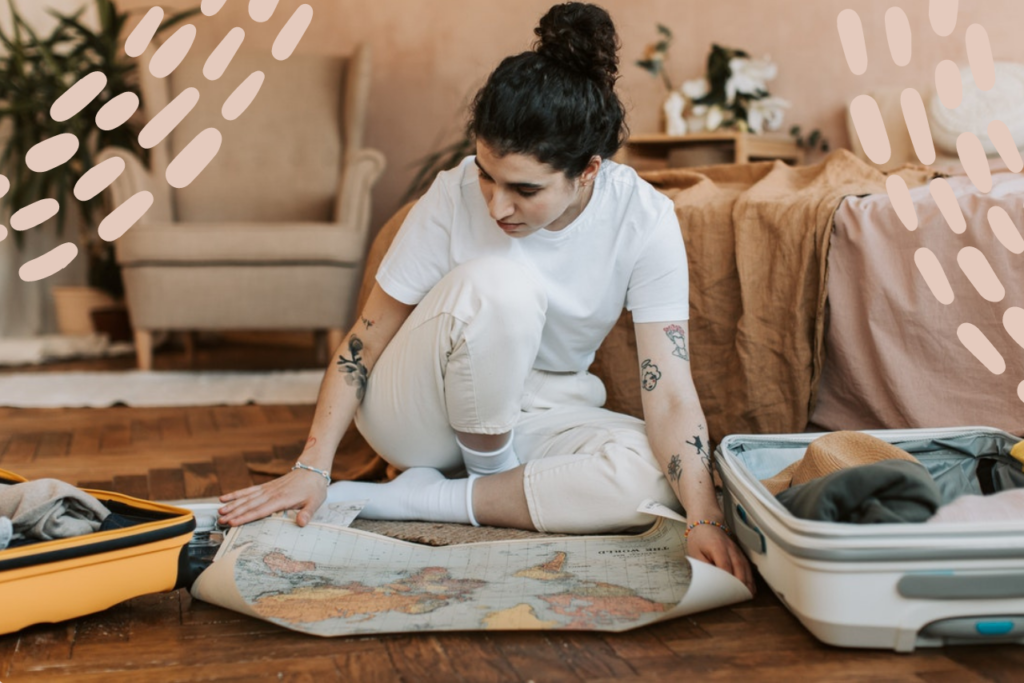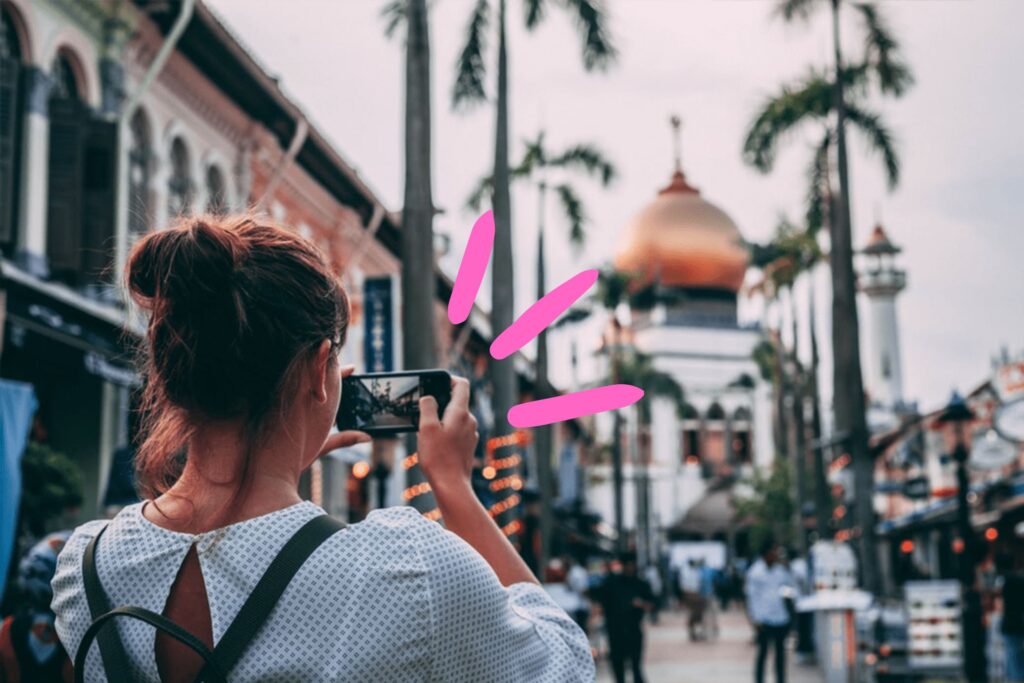Are you yearning to explore vibrant cultures, savour exotic flavours, or simply escape the British drizzle this summer? For students itching to spread their wings and venture beyond their university campuses, the world really is your oyster, with technology helping make so many elements of travel smoother than ever before.
With that in mind, we’ve put together this treasure trove of insightful advice and budget-friendly hacks, tailored to ensure every wide-eyed globetrotter makes the most of their adventures — without leaving their common sense (or their wallets) behind. So grab your sunnies, dust off your backpack, and let’s get cracking on crafting the trip of a lifetime.
Don’t Be Afraid To Go Solo
If you’re eager for an adventure this summer but can’t find a pal to go with you, don’t be scared to take a ‘solocation’.
We get it; going to a foreign country alone may feel intimidating, but it needn’t be. In fact, there are some pretty pleasing perks to doing things solo. You can grab the last seat on a flight without the need to consult with anyone else. You can park yourself on that single stool at the hottest streetfood ticket in town. You can squeeze into a skytrain without worrying if there’s extra room for a companion…
Indeed, being on holiday with nobody else means you only have to cater for your own needs. Should an unexpected opportunity arise, you can jump on it! It is your holiday, and yours alone to enjoy.
Read: How to make friends when travelling solo: 7 ideas & tips

Maximise Your Student ID
ISIC, which stands for International Student Identity Card (ISIC), will help identify you as a student in over 130 countries. But this isn’t just some badge of honour or proof of being a card-carrying scholar. Nope, this card is the only student ID that is internationally recognised for student discounts around the world.
As the budget student airline experts at Flyla tell us, your ISIC can be used to help you sign up for a whole host of money-saving options, from getting discounted fares on flights and trains to getting as much as 15% off any accommodation that’s part of Hostelling International, as long as you’re a member (membership is just £8.95).
But that’s not all; UNESCO’s International Student Identity Card’s unlocks discounts on access to more than 150’000 sites worldwide, and many guides provide ISIC-related cut price tours, too. There really is no reason not to carry yours!
Read: Debunking myths & sharing secrets for nabbing cheap flights in 2023
Use A Prepaid Credit Card
Though received travel wisdom suggests that you should always take out a small amount of cash in the country you’re travelling, this isn’t perhaps as pertinent as it once was, with the proliferance of easily accessible ATMs and modern, progressive banks ready to waive withdrawal fees to get you on board.
App-based banks such as Monzo and Starling are excellent options for students looking to manage their money while travelling (and not carry loads of cash around). On both platforms, you can allocate your travel budget to different pots or spaces. You can even lock Monzo pots to add in a layer of caution to your spending.
When it comes to credit cards, the Halifax Clarity stands out as a particularly keen travel companion, offering fee-free transactions worldwide. You also don’t have to pay fees when you pay for goods in shops or restaurants either, all providing you pay off your credit card in full each month. That said, you will be charged interest on cash withdrawals until you pay off the balance.
FairFX’s currency cards are also popular with travellers, boasting a streamlined approach that eliminates hidden costs while travelling, ensuring stress-free financial management on-the-move.
Whichever you choose, it’s a good idea to bring more than one prepaid travel card with you, just in case one gets lost or stolen.
Ideal Tip: When you’re visiting another country and paying for something with a credit card, you’ll be asked if you want to pay in your home or the local currency. This option for paying in your home currency is called dynamic currency conversion. However, it can lead to hefty fees. Always pay in the local currency as your bank will convert the charge at favourable conversion rates for you.

Stay Connected (But Not Too Much)
While it’s important to stay connected with loved ones back home, don’t let technology consume your entire trip, especially social media.
Sure, social media may have revolutionised the way we travel and certainly provides tonnes of inspiration, but according to a survey by Booking.com, half of Gen Z (53%) think too much emphasis is placed on social media when travelling.
As reported by the Bangkok post; “Many Gen Zers travel for the sake of social media. Some 60% of Gen Z surveyed said they’re interested in travelling that will look good in pictures – this is no way to travel.”
Social media can wait. Immerse yourself in the present moment instead. Engage with locals, strike up conversations, and create memories that will last a lifetime. Remember, the best stories are often the ones that can’t be shared online!
Safety First
That said, it is essential to exercise a little caution when on-the-go. Give your friends, family and yourself some peace of mind and let them know a rough itinerary of your holiday before you go, so if they don’t hear from you then they will know where they should contact.
Consider using a GPS tracker; there are numerous apps – Bsafe and NOONLIGHT are two popular ones – which allow loved ones to know your activity, offering them peace of mind that you are safe. If, in an emergency, they can’t locate you, then they will be able to alert the necessary authorities.
Securing your possessions is important, too. As a student traveller, you’re likely to be on a budget, making it all the more crucial to safeguard your things and invest in travel insurance. The thrill of exploring new destinations can quickly sour if you find yourself the victim of theft or loss. Here are some practical tips to keep your belongings secure:
Be Discreet with Valuables: Flaunting expensive gadgets or jewellery can make you a target for thieves. Use inconspicuous bags and keep your valuables close to your body. Consider a money belt or a hidden pouch for your passport and money. When staying in hostels or shared accommodations, use lockers or safes provided.
Stay Organised: Keep your belongings organised and take inventory before and after each leg of your journey. Knowing exactly what you have allows you to quickly notice if something goes missing. Use luggage locks and always keep your bags zipped and secured. Better still, MAX cases provide a whole suitcase that’s about as secure as it comes.
Backup Important Documents: Scan or photograph important documents such as your passport, travel insurance policy, and visas. Store these digitally in a secure cloud service or email them to yourself. This way, if your documents are lost or stolen, you can access copies quickly.
Travel Insurance: While it may seem like an additional expense, travel insurance is a safety net you shouldn’t ignore. It can cover the cost of lost or stolen belongings, medical emergencies, trip cancellations, and other unforeseen circumstances. As a student, you may be more prone to taking risks or trying adventurous activities, which makes having insurance all the more pertinent.
Health and Possessions Cover: Ensure your policy includes health cover and coverage for your possessions. The NHS won’t cover you abroad, and replacing lost items without insurance can be costly. Check the fine print for exclusions and make sure high-value items are covered.
Emergency Contacts: Keep a list of emergency contacts, including the local embassy or consulate, emergency services, and your insurance provider. Having these contacts readily available can save precious time in a crisis.
Stay Alert: Finally, always be aware of your surroundings. Pickpockets and scammers often target tourists, especially in crowded places. Trust your instincts—if something doesn’t feel right, remove yourself from the situation.
Read: 9 essential travel tips for solo female travellers
Embrace Spontaneity
Phew, after that rather maternal interlude, let’s get back to living in the moment! While it’s essential to have a rough itinerary, don’t be afraid to deviate from it. Some of the most memorable experiences happen when you least expect them. Embrace spontaneity and seize opportunities that come your way. Whether it’s exploring hidden gems or joining a local festival, allow yourself to wander off the beaten path.
Being A Respectful Tourist
Deserving of its very own subsection, let’s dive in…
Watch What You Wear
Being a respectful tourist may require dressing up more conservatively than you may do back home, particularly when visiting places of worship or someone’s home, but also as you stroll the streets of your new destination. Thinking of going topless as you strut around Hanoi, Havana or Honolulu? Just don’t.
Ethical Photography
When it comes to taking travel photos, you need to be mindful of who or what is within shot. If you’d like to take a picture of someone, be it a shopkeeper or a hawker cooking on the street, be polite and gain their consent first. When in places of worship, look for signs and obey them; taking photos is usually forbidden.

Cultural Differences Of Gestures
Student travellers should be mindful of the diversity of gestures globally, too. For instance, while in the States and the UK, the ‘thumbs up’ gesture is ubiquitously appreciated as a sign of approval, in parts of the Middle East, it can be perceived as offensive. Similarly, in Japan, beckoning someone with your palm upward, as customary in several western cultures, is considered uncouth, and reserved for pets; instead, the Japanese beckon with the palm facing down and fingers waving.
In Bulgaria and Iran, shaking your head may sometimes mean ‘yes’, and nodding ‘no’ – quite the opposite of many other cultures. Thus, it is imperative to attune oneself with the cultural nuances of the host country to promote respect and understanding. Remember, the ability to communicate effectively and adapt culturally is as crucial as your backpack or your guide book.
Leave No Trace
As responsible travellers, it’s our duty to preserve the beauty of the places we visit. First, don’t mess with Mother Nature. Avoid littering, recycle when you can, and use public transport or your own two feet instead of taxis or rented cars whenever possible. Say ‘no’ to single-use plastic. Use refillable water bottles, bring your own bags when shopping, and carry reusable cutlery. If you’re checking out awesome cultural spots, remember it’s ‘look, don’t touch’—don’t disturb anything.





